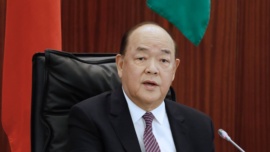
Rui Filipe Oliveira, Partner, MdME 
Carlos Eduardo Coelho, Partner, MdME
On November 3, 2022, the Legislative Assembly has approved Law no.15/2022 (the “Trust Law”). It is the first time that the Macau SAR legislates trusts, a legal concept more typical of common law jurisdictions. The broader policy behind this legislation is economic diversification and themodernization of Macau’s financial system.
In fact, with the rapid economic development of Macau in the last decades, social wealth has accumulated and the demand for wealth management solutions increased. The enactment of the Trust Law aims to provide the public with innovative property transfer models and flexible estate planning. It will also allow banks, insurers, and other financial institutions to offer diversified financial and insurance solutions to meet those needs. The Trust Law has come into force on December 1st , 2022.
1. What is the legal definition of a Trust?
A trust is an arrangement by which a trustor transfers the ownership and control of certain assets to a trustee, who holds, manages and disposes such assets in the interest of one or more beneficiaries.
2. What is the legal status of a Trust?
A trust does not have legal personality. It is an estate with autonomy composed by an accumulation of assets. It is similar in that way to an investment fund or a pension fund. A trust’s estate is independent from the estates of the trustor, the trustee, and the beneficiaries.
3. What could be the purposes of a Trust and
how may it be used?
A trust may be used to hold and protect personal or business assets and to isolate such assets from risks arising from the future activities of the trustor. Trusts may also be used to ensure the continuity of ownership and the preservation of estates. For these reasons, trusts are typically used as instruments of wealth management, estate
distribution and risk minimization. Trusts are also convenient vehicles for employee share schemes where the trust can hold the shares for the benefit of employees and dividends are distributed to the beneficiary employees without the need for ownership of the shares to change when employees join or leave the company. Significantly,
trusts are often utilized within the financial and the insurance sectors to create and market diversified investment and insurance products.
4. How do you form atrust?
A trust may be formed by contract (a living trust) or by will (a testamentary trust). A living trust is formed with the execution of a private document (constitutional document), unless other formalities must be observed due to the nature of the property allocated to the trust (e.g., real estate property will require that the
trust is formed by public deed). A testamentary trust is formed by execution of a will pursuant to the rules of elaboration of wills as stipulated in the Macau Civil Code.
5. What are the key differences between a
Living Trust and a Testamentary Trust?
One of the key differences is the moment when the trust becomes
effective. A living trust is effective on the date determined by a living trustor or upon the satisfaction of any condition precedent set out in the trust constitutional document. A testamentary trust is only effective upon the death of the trustor. Significantly, a testamentary trust must comply with the rules governing the disposition of assets in death emerging from the Macau Civil Code.
6. What type of assets may be held on Trust
and how are they protected?
Any type of asset may be allocated to a trust and one single trust may have different types of assets, including movable assets (e.g., shares) and immovable assets (e.g., real estate). In the case of assets subjectto mandatory registration, their transfer to the trust is also subject to registration. Such assets will be registered under the name of the trustee, with specific indication that they are property of the trust.
The assets allocated to a trust are, in principle, only liable for debts arising from the management of the trust’s estate.The trust’s estate is therefore protected from debts or liabilities incurred by the trustor upon the formation of the trust.
7. Who can be a Trustee and what are the
main rights and obligations of a Trustee?
Pursuant to the Trust Law, only the following types of entities can act as trustees:
- credit institutions
- financial companies
- asset management companies
- investment fund management companies
- insurance companies
- pension fund management companies
- entities permitted to engage in trust business under special laws
A trustee owes a fiduciary duty to the trust’s beneficiaries and is required to administer the trust solely for their benefit. That means that a trustee is prevented from acting in conflict of interests vis-à-vis the beneficiaries and from deriving any benefits to third parties or to itself (other than the agreed management fee). A trustee is also obliged to: (i) keep proper and updated records of the as a trust’s estate and activities, as well as of the rights of each beneficiary; (ii) maintain the trust’s estate clearly separated from its own estate and from other trusts’ estates under its management (both from an accounting and a management standpoint); (iii) keep secrecy in respect of any facts and information obtained in its capacity of trustee; (iv) keep the beneficiaries informed in respect of their rights under the trust as well as in respect of the trust’s assets.
8. Who can be a Beneficiary and what are the
main rights of a Beneficiary?
Any person (individual or legal entity) can be a beneficiary, including the trustor and the trustee, although the later cannot be the sole beneficiary. A trust may also be set up for the benefit of descendants of an identified legal person who is not yet born or conceived. If there is more than one beneficiary, it is presumed that they benefit from the trust in equal shares, unless otherwise stipulated in the trust’s
constitutional document. The beneficiary’s entitlements under the trust are defined in its constitutional document. They may be assigned to a third party and pass on to its heirs unless otherwise determined.
9. What is the tax treatment of a Trust?
xThe Macau Trust law does not provide a specific tax treatment for the formation of a trust, nor for the income derived from the trust’s assets. This is a gap in the Macau Trust Law and, in the absence of further legislation, may inhibit the full potential of the trust mechanism. As a result, the transfer of assets to and by the trustee
as well as the income generated by the trust’s assets does not benefit from any favorable treatment under the current tax framework. This has the following key implications:
a) Formation of a living trust:
At the inception of the trust, stamp duty tax may apply to the
transfer of the following assets to the trustee:
i. Transfer of real estate property;
ii. Transfer of movable property, subject to registration in
Macau, and which is valued in excess of MOP50,000;
iii. Transfer of any other movable property made by public
deed or notarial document.
b) Formation of a testamentary trust:
No stamp duty transfer tax applies to the transfer of any real
estate or movable property to the Trustee
c) Management of the trust:
Income deriving from the trust assets shall be subject to normal income tax applicable to the type of income generated. As an independent estate, the income arising from the trust’s assets should be subject to separate taxation
from that of the trustee’s own income. Any income distributed to the beneficiaries may potentially lead to double taxation situations, as such income will formally be
received by two different tax subjects. In the absence of clear, express rules in this respect, the matter is subject to interpretation by the tax authorities and/or the Courts.
d) Transfer of trust property to the beneficiaries
The rules referred above for the creation of a living trust
apply to the transfer of the trust property from the trustee
to the beneficiary.
e) Acquisition and transfer of the trust benefit
The acquisition and transfer of the trust benefit by the
beneficiary may be subject to income and/or stamp duty tax,
depending on the beneficiary and of the nature of the benefit.
f) Trustee’s remuneration
10. How is a Trust terminated and what are
the consequences of termination?
A trust may have a specific duration, determined in its constitutional document, or be formed without an end date. A trust is extinguished in the terms defined in its constitutional document, as well as in the circumstances defined under the Trust Law. These are, amongst others:
(i) by written agreement between the parties; (ii) when the
same person becomes the sole beneficiary and the trustee; (iii) when
all beneficiaries waive their rights to the trust’s estate; (iv) when the
trusts’ estate is totally lost or perished.
























